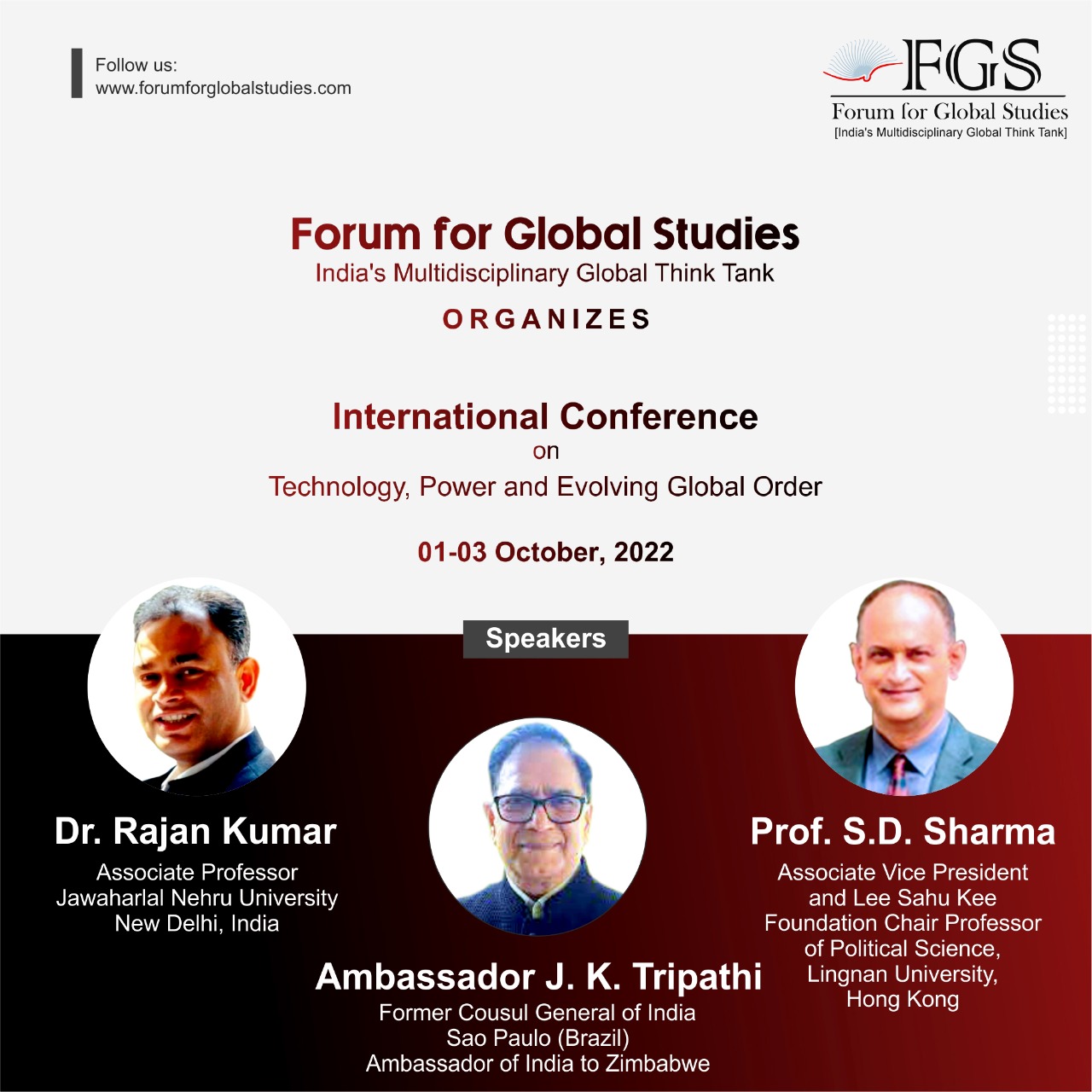DAY 3
Technology, Power, and Evolving Global Order
Third Session
Event Report
On 3rd October 2022, the Forum for Global Studies, New Delhi, a multidisciplinary global think tank, hosted the Third Technical Session of a three-day international conference on “Technology, Power and the Evolving Global Order”. The theme of the session was “Contemporary Warfare and National Security”. Dr. Aparna Bose was the chairperson of the session with Dr. Archana Mishra as co-chairperson. Mr. Simant Shankar Bharati and Dr. Aparna Bose shared their valuable insights on the theme and opened the floor for paper presentation.
Mr Pranay Kumar Shome started presenting his paper on the topic,” Contemporary Warfare and National Security”. The research paper gave an in-depth understanding about the relationship between contemporary warfare and national security, the emerging forms of threats to national security, how it must be tackled and the way forward. The research methods involve understanding the nature of contemporary warfare, the psychology behind the actors involved in modern day conflicts, delving on the literature of military strategists like Alfred Thayer Mahan, Kautilya and how their principles and lessons are still relevant when it comes to bolstering the national security of nation-states in contemporary warfare. Further the research paper articulated emerging national security threats like hybrid terrorism, contemporary forms of warfare like hybrid warfare, misinformation as a weapon of war, contemporary weapon systems like drones, spyware and their applications.
Dr. Saddam Hussain presented his paper on the topic, “Changing Dimensions of Hybrid Warfare: Emerging Threats to India in 21 St Century”. Provided an understanding of hybrid warfare and emerging non-conventional threats to India in 21st Century. Modern day warfare style has changed with the technological advancements in the security structure and the military strategies of a country. Now war waged not only with the intentions of materialistic destruction rather it aimed to destroy the very capacity-building procedure; be it the hardware part or the software segment of military strength. The paper discusses that India, as a multi-religious, multicultural, ethnically complex, has been prone to hybrid warfare throughout independence. Pakistan using digital technology and platforms continued to breach India’s internal social bonding and tried to defame India through propaganda, fake-news, and other irregular methods at global platforms. Chinese threats have resulted in digital attacks on India’s sensitive security structures. The most crucial hybrid threat India has faced in recent years are cyber-attacks. The paper highlights that the digital divide (propaganda building and security breaching using social media), breaches of the digital economic system, cyber-attacks, chemical and biological weapons has been used as a tool of hybrid warfare in the contemporary world.
Ms Shalini Singh presented her paper on the topic, “China’s Economic Coercion- A Tool for Asymmetrical Warfare”. The paper highlights the economic coercion by China during Xi Xinping’s era by focusing on the “passive” leverage it got and the chance to influence debates and political winds in other countries. The paper uses qualitative methodology to pinpoint China’s economic coercion with a definite timeline and case-by-case study of different countries facing the coercion. Economic Coercion has emerged as the new tool of economic statecraft. Economic coercion often comes under the umbrella term- asymmetrical warfare – a battleground where knowing you can’t defeat the enemy directly, therefore you sought to target the areas where it will hurt your enemy the most. Economic coercion includes high tariffs, sanctions, fines, and checks on market access by restricting specific products or embargoes. Economic Coercion has become a common sight keeping in mind the strained relations and high economic interdependence between the countries. It is also known as a major tool of foreign policy. Sometimes, economic coercion is used as an overture to war, and in some cases, accelerated tensions can be accompanied by military action. China, which has always promoted non-interference in foreign countries’ affairs and economic openness, has become a frequent user of economic coercion.
Ms Vaishnavi Singh presented her paper on the topic,” Understanding Contemporary Warfare and National security”. She tries to relate the theme of national security to social media threats. Cyber security is not just a matter of national security but also the matter of human security. National security comes into picture when addressing the issue of territory, conflict, disputes, and terrorism. In recent times, it has broadened to climate change, cyber security, human security and much more. The paper examines how cyber threats are becoming a real source of threats when it comes to national security especially by analysing social media threats as real threats to national as well as human security.
Prof. Alok Chansoria, Hawabagh College,Jabalpur and a Gandhian philosopher was the guest speaker of the session. He draws light upon the four cardinal principles of Gandhian philosophy- Truth,Non-violence, Satyagraha and Sarvodaya. He points to the pessimistic realities of the global world often dominated by internal conflicts and loss of people’s lives. He emphasizes upon the idea of “Vasudhaiva Kutumbakam”, the notion that the world is one family. He also illustrates that the concept of country cannot be separated from the concept of life. Hence, he urges the need to discuss Gandhian philosophy in the contemporary world to achieve a global peaceful world order.
With that, Dr. Sandeep Tripathi, President and Founder, Forum for Global Studies, thanked participants and guest speaker for delivering their insights in the final l session of the international conference and enlightening attendees with mind blowing remarks. The international conference is an eye opener and provides crucial assessments for all stakeholders associated with the field of international relations and global studies.

